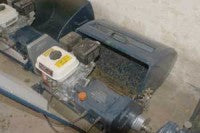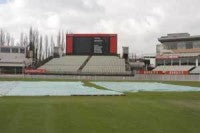Early season preparations at Edgbaston
Early season preparations at Edgbaston
By Steve Rouse, Head Groundsman, Warwickshire CCC

Having returned from a well earned holiday break in Cape Town, South Africa, I came home to face the usual April weather, plenty of rain, rain and more rain, coupled with strong winds that in fact had blown the main covers all around the ground.
My main task was getting the first match wickets prepared for Middlesex on the 16th April and Hampshire on the 25th April, two games very close together and not allowing much time for preparation, especially with the weather not favourable. Other issues included the preparation of the practice wickets ready for the players who had just reported back for training.
To achieve even rolling it's important to ensure there is a uniform layer of moisture in the soil profile, down to at least 100mm depth, then start rolling with a 2 ton roller and continue to roll regularly for half an hour a day. The wickets are then raked three times and mowed down to 10mm, still quite long. The reason for this was to ensure that the tracks did not dry out too quickly. If they do, they tend to form a crust which in turn cracks and then moves; not a suitable surface to play cricket on.
This year I have enlisted the help of a consultant, David Bates, who comes in every two months to take samples and to keep me informed on what fertiliser to use. We look to apply a feed every 6-8 weeks depending on weather and conditions. He has designed a feeding programme for the ground that will see over 40 tons of material being used at Edgbaston this year alone. It has been a struggle to fertilise the ground this season with the weather and the amount of fixtures being played. The timing is critical, as I do not want to apply fertilisers too close to a game and finding out that I have wickets that will be too lush.


At the end of last season I tried out the Graden scarifier, and it did a marvellous job. I had already used the SISIS machine, getting a lot of debris out of my squares, but then went over them with a Graden we hired. I was amazed at the amount of material that came out, so I decided to buy one. It only arrived in April, and I can't wait to use it. In fact I may well be able to use it to repair some of my older wickets once we have used them during the early part of this season. I intend to rip them up using the Graden, then vertidrain and top dress with loam, try out some new seed by Rigby Taylor with the hope by the middle of July they will be good as the start of the season. That's my plan!
With all the recent wet weather my staff have spent most of their days moving covers on and off. They take some moving, especially when they have water on them. I have purchased two new breathable covers from Total Turf Solutions (TTS), and they have been fantastic, very lightweight and easy to move. They can be left down for longer periods and they have not promoted any Fusarium disease to date. I am so impressed with them I have ordered two more.


I am lucky at Edgbaston because I have very dedicated staff and an understanding manager who supports me and allows me to develop and introduce new technologies and ways of working. I have five fulltime staff that, including myself, have over 80 years working experience at Edgbaston, with some having been here for more than 20 years. I believe experience is an essential part of groundsmanship. We learn many things from working in a hands on capacity. However, it is important to keep ourselves up to date with the latest technology and products now being developed for our industry.
I will be hoping for some better weather in May. It would be very nice to have some decent sunny weather to enable us to produce the fast and pacey wickets for our players, both for practice and playing.
